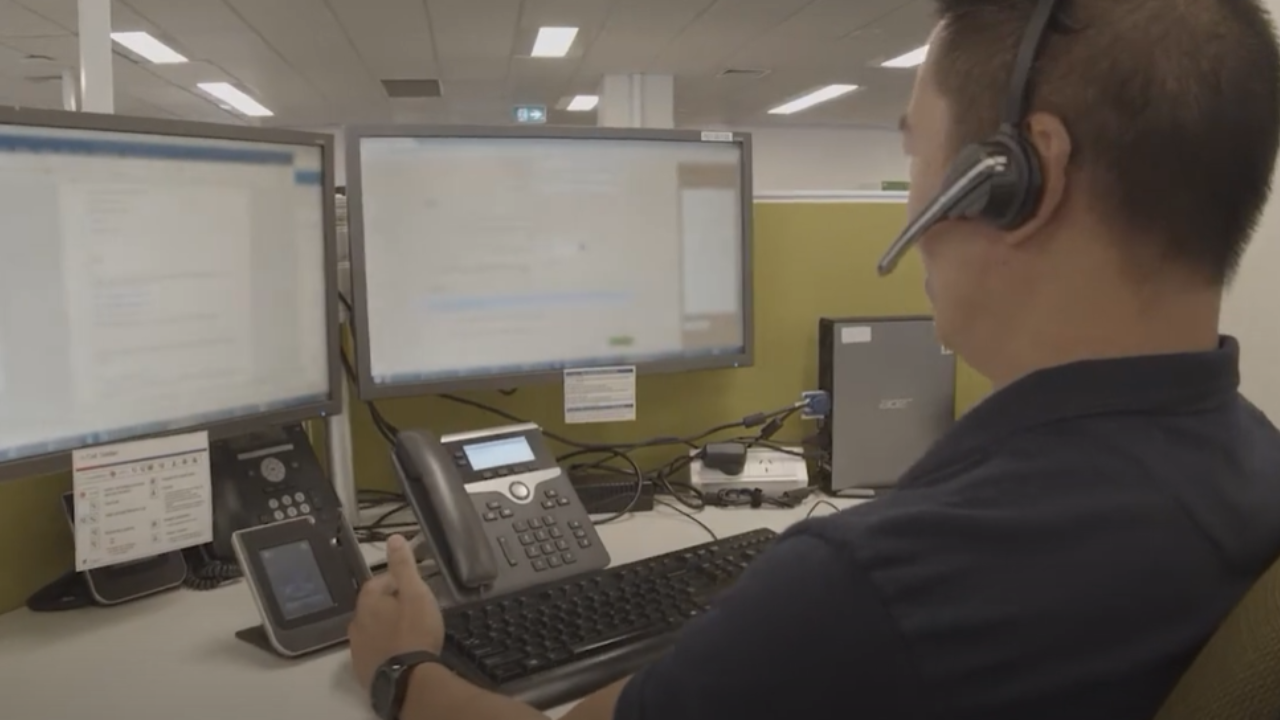Automatic language translation
Our website uses an automatic service to translate our content into different languages. These translations should be used as a guide only. See our Accessibility page for further information.

Client Service Officers (CSOs) are the frontline of Housing Services and provide a broad range of tenancy and property management services and advice.
Client Service Officers (CSOs) are the frontline of Housing Services and provide a broad range of tenancy and property management services and advice.
(Client Service Officer talking to a client on the phone.)
Anne, Client Service Officer, Housing Contact Centre: I'm a Client Service Officer CSO at the Housing Contact Centre. Been working with the call centre for near on 20 years now.
Alex, Client Service Officer, Housing Contact Centre: Been here three and a half years. I help people in need whenever they call in.
Rebecca, Client Service Officer, Housing Contact Centre: I work at the Housing Contact Centre in Liverpool, and I've been employed here for 20 years.
(Rebecca talking to a client on the phone.)
Noemi, Client Service Officer, Tenancy Team: I work in the Liverpool tenancy team and I've been with the department 13 years.
Adrian, Client Service Officer, Outreach Team: I work for the sort of outreach team in Northern New South Wales around Tweed Heads.
(Adrian driving to visit a client.)
Anne: We're basically here to help people, those that are vulnerable in the community that may be homeless or maybe looking for accommodation, and they just need some help with steps to lead them on the way.
Alex: We've been able to help people get into emergency accommodation and give a helping hand just when they need it the most.
(Housing Contact Centre helped people effected by bush fires.)
Noemi: So 300 properties I manage. So within those properties could be single people it could be a family of five.
(Noemi taking picture of a property for assessment.)
Adrian: We basically go out into the streets, into the parks and we find homeless people we put them into temporary accommodation if they're so willing to go into and we try to find suitable housing for them.
(Adrian driving to visit a client.)
Noemi: A day in the life of a Client Service Officer would include doing a counter shift where you sit on the counter and serve people of a morning or afternoon. Doing client service visits, we visit my 300 properties that I manage. It would be taking forms and doing rent subsidies. It could be any number of complaints that come in and I try and sort it out for the tenants.
(Noemi assessing a property.)
Anne: To start the day with calls come into the housing contact centre. So it's a call centre. We're taking calls all day log into the computer, set ourselves up. We take many calls, many different lines, after a while, it can become a bit draining, but you move forward and then you may just be working off the phones processing applications.
Alex: I'll come in the morning and go into the kitchen, make myself a cup of coffee and check the news. See if there's anything that might impact our day. And from there, we'll take calls.
Rebecca: Nothing's ever the same. Calls are always different. We answer general inquiries and then we go on to help homeless people. We help domestic violence people. We help so many different people.
(Adrian interacting with a colleague in the call centre.)
Adrian: Recently we found a gentleman in a van who had cancer. Couldn't do chemo because he was in his van. He's now in temporary accommodation doing chemo again and his life is back on track.
Anne: The training at the HC is absolutely brilliant. You're not just thrown in there. There's always plenty of training available.
Alex: You should definitely bring along with you, your energy levels, having enthusiasm.
Anne: You really have to have a lot of empathy for the clients and your communication skills have to be, I would say superlative.
Noemi: The workload can be quite heavy, but if you have good time management skills, you will be fine.
Anne: But I would say the main challenge would be trying to determine yourself how you're going to help a certain client. And each client is different. We always say here, put a different hat on, okay, today I've got to have this hat on because this person needs this type of assistance. What do I do?
Adrian: The challenges also include the mental health issues involved. The drug and alcohol issues. All of which we wrap services around, try to work with people. It doesn't preclude them from our programme. The advantages of working for the department in this sort of role, any sort of role the job opportunities are literally endless.
Noemi: There's heaps of career progression within housing.
(Noemi walking the Rebecca in the office.)
Rebecca: Always room for advancement. If that's the way that you want to go.
(Alex talking to a client on the phone.)
Alex: I joined this department because of the fantastic service that our people in the site been providing to those in need.
Noemi: What I love about being a CSO is the people that I get to meet, some of our clients are beautiful, the people I work with, and I love the variety that the role has.
(Noemi walking the Rebecca in the office.)
Anne: At the end of the day, we do have an impact and that it's real people.
Rebecca: We help so many different people. And everybody that I work with is very supportive of each other. And it's just a great place to work.
Adrian: Basically, we go home, and we can talk to our partners and our friends and family, knowing that we're actually changing people's lives. It's incredible feeling.
Alex: Being a part of the team. Just made it all inspiring.
"I take pride in assisting vulnerable clients in need. As the first point of contact over the phone, I have the privilege of addressing their concerns directly. The hope and smiles we bring to our clients, even through the smallest actions, give me a strong sense of accomplishment. I am fortunate to be part of an outstanding team that is both supportive and a pleasure to work with."
- Hari, Client Service Officer

Client Service Officers (CSOs) are the frontline of Housing Services and provide a broad range of tenancy and property management services and advice.
Housing Services is part of the Housing, Disability and District Services and Emergency Management division under the Department of Communities and Justice. Housing Services is one of the largest providers of social housing in the world, providing a range of housing solutions to meet the needs of approximately 800,000 people every year.
In partnership with the community, industry and individuals, Housing Services provide safe and affordable housing opportunities for those most in need so that they can live with dignity, find support when needed and achieve independence.

35 hour week Monday to Friday.
Attend CSO Induction training for two weeks, with the first week to take place in Sydney city, followed by online training during the second week. For those who reside outside of Sydney metro, all expenses will be paid for by DCJ.
Paid Certificate IV in Social Housing accredited training, on the job over 12 months.
Ongoing learning and development opportunities available on the job.
Housing Services provides services to various communities across the state, making it important to have a diverse and inclusive workforce that contributes to better outcomes for our communities.
Aboriginal and Torres Strait Islander people make a significant impact to the organisation by improving the way we interact with Indigenous communities and help inform and shape cross-cultural services.
Last updated: